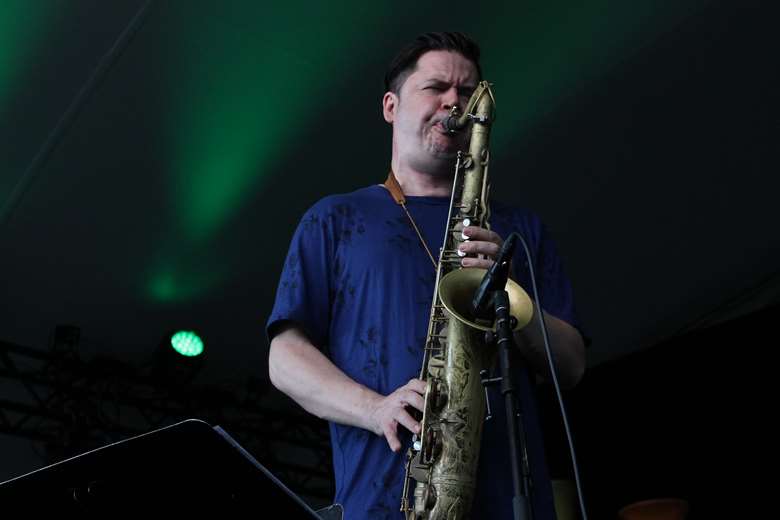Seamus Blake and many more dazzle at Jazz Juniors Festival
Nick Hasted
Monday, November 22, 2021
Krakow’s long-running festival showcases established stars and emerging talent

Jazz Juniors has been discovering talent for 45 years, through its International Competition of Young Ensembles. But it’s fiery New York veteran Peter Evans’ solo trumpet marathon in Krakow’s accompanying festival which burns in the mind. The ghost of Louis Armstrong’s tortured embouchure hovers over more than an hour of reckless high notes and violent exploration.
Dusty light beams through the church-like windows of the Cricoteka arts centre, as breaths are amplified into dragon-gasps, and keys industrially hammered. In one slashed and burned classical theme, Flight of the Bumblebee meets Linda Blair’s bilious Exorcist expectorations. A single note is raided from all sides, exploded then hand-muted. Sucking, squeaking breath spirals up, then diminishes effortfully, becoming the shuddering last gasps of a cornered beast; sung overtures join hints of African percussion and reedy clarinet. And that’s just tune one. When the mute silences a last, small, close-miked sound, Evans taps his instrument experimentally, as if squeezing the last drop.
Jazz Juniors’ mentoring remit is met by Evans’ humbly committed ensemble work when a young Polish quartet then play his compositions, the composer’s presence bookending the set. Pianist Kajetan Borowski’s hands clasp over the middle keys, fingers barely lifting, hammers barely hitting, the pulse murmured ghost music beneath drummer Piotr Budniak’s rounded, tumbling tattoos. This Monk-like intent suits music of cool introspection and withheld explosions, doing as much as Evans’ own set to show his range.
Among the other headliners, saxophonist Adam Pierończyk is joined by former Miles guitarist Jean-Paul Bourelly, and Moroccan multi-instrumentalist and throat-singer Majid Bekkas. A ritual, meditative drone led by Bekkas’s guembri (bass lute) is followed by a piece in which Pierończyk triggers stygian laptop waves, while Bourelly, sat like a grizzled Buddha, turns fractured Afro-blues-rock into a thickening, heavily rhythmic fug. Completing an international double-bill, German Nils Wogram is a remarkably gentle, quizzical, pretty trombonist, and his veteran Root 70 band’s music is so marvellously precise in construction it seems almost mechanistic, till the tearaway ‘Hot Summer Blues’. Saturday night starts with young Polish bassist Maciej Kitajewski’s trio, plus guest Slovenian saxophonist Jure Pukl. Kitajewski’s tunes are mildly rueful and warmly open-hearted. His good-natured, high-necked bass solo is met by Pukl’s bright, unhurried, round-toned melodic statements. There’s no side to this sunny music, with the balmy, somewhat wistful appeal of a holiday romance. In the following, solo set, New York-based Canadian Seamus Blake is affably geeky, with his adopted city’s sardonic edge. His laptop and EWI allow Afro-synth-funk in 15/8 and shoulder-twitching 1980s dance music. More sax, and less erratic technology, might have been more convincing. In the competition, Budapest’s Nagy Emma Quintet won the Grand Prix.
Emma Nagy’s voice has a hovering mermaid moan, letting syllables float and fade. The lyrics are almost masochistically devoted, the effect fairy-tale pure, as the band skitter intricately beneath. Second prize is shared by Italy’s Dolphy devotees Federico Calcagno & The Dolphians and Poland’s Superminimalism, with bronze going to boppish Poles Unleashed Cooperation. In a jazz time of universal academic proficiency, Ziemia’s inchoate, shambling shape stands out more than those runners-up; so too their guitarist’s soft, dreamy prettiness. London quartet Twospeak’s guitarist Mike De Souza is also moodily thoughtful, alongside keyboardist Joseph Costa’s impressionistic, raindrop keys.
Previous prize-winners are among the late-night, showcase bands in the hotel basement Milestone Jazz Club. The Kuba Banaszek Quartet are, oddly, the most divisive, as they defiantly, insistently stick to relentlessly downtempo, deeply romantic reveries. This is slow jazz, by beautiful balladeers. Chyła Mizeracki Special Project offer contrastingly careening, rock dynamics, while the saxophonist leader of Marta Wajdzik Experiment hits screaming highs. Marcin Pater’s vibes mark out his trio, as both breezily melodic lead and tougher than usual rhythm instrument. Violinist Stanisław Słowiński – following in the tradition of his late, great Polish compatriot Zbigniew Seifert – leads a black-garbed crew, trumpeter Zbyszek Szwajdych an attacking right-hand man like Dr. Feelgood’s Wilko Johnson, till they sink into Central European weariness. Dramatic dynamics match their stark, black style. Solo violinist Bartosz Dworak later loops in mild electro-blizzards, as he emotes and meditates over drones. Seti Setters are distinguished by Stanisław Słowiński’s Modular synth, suggesting a sort of avant-agrarian, hippie futurism as he sits cross-legged, turning dials. Guitarist Paweł Mańka’s Semiotic Quintet conjures a splintered Harlem ballroom daubed with Polish Expressionism, and Franciszek Raczkowski’s glinting spider’s-web piano, while pianist Grzegorz Ziółek leads a sometimes thunderous band of churning grit and motorik grooves. Outside the festival, Krakow’s tourist economy depends on Auschwitz – a necessary, painful pilgrimage for some – and a former Silesian salt-mine. Its modern atmosphere is, though, relaxed and bohemian, a fitting home for this annual restatement of jazz hopes.